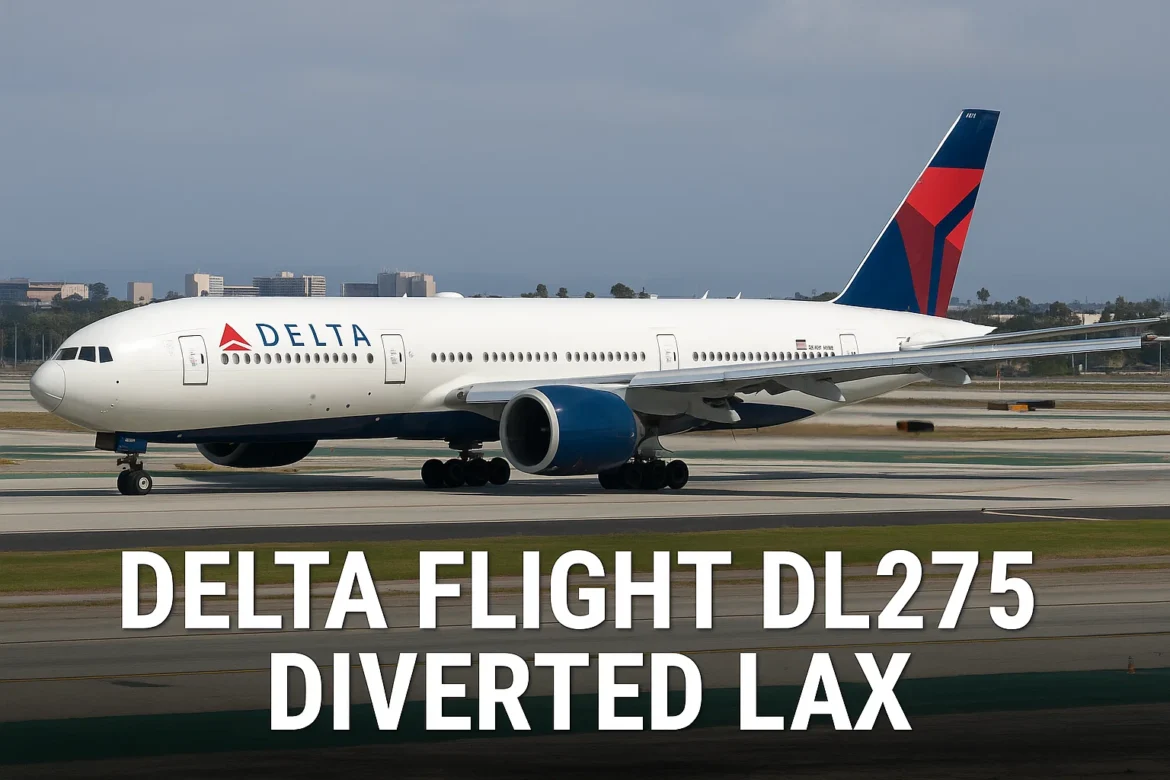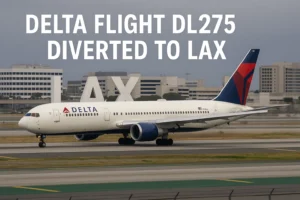
Air travel is one of the most reliable and safest modes of transportation, but even the most well-organized flights occasionally face challenges that lead to changes in schedule or routing. A recent event that caught the attention of passengers, aviation enthusiasts, and news outlets alike was when Delta Flight DL275 diverted LAX. The diversion created questions, concerns, and curiosity among travelers and the public. This article provides an in-depth analysis of what happened, why flights get diverted, the broader implications for passengers, and how airlines handle such disruptions to ensure safety and service.
What Happened During Delta Flight DL275 Diverted LAX
Delta Flight DL275, originally scheduled for a different destination, made headlines when it was unexpectedly rerouted and diverted to Los Angeles International Airport (LAX). While diversions are not unusual in the airline industry, the story of Delta Flight DL275 diverted LAX raised particular interest because of the scale of disruption it caused for travelers. Passengers were caught between uncertainty and curiosity, wondering what exactly had forced the flight to land at LAX rather than continue to its intended destination. Reports suggested that operational, technical, or safety-related factors might have influenced the decision. For those on board, the sudden announcement was met with surprise, but also relief that the airline prioritized their safety above all else.
Reasons Why Delta Flight DL275 Diverted LAX
There are numerous reasons why a flight such as Delta Flight DL275 diverted LAX might occur. Diversions are typically not made lightly; they often stem from factors outside the crew’s control. Some of the most common reasons include:
-
Mechanical or Technical Issues – Even though airplanes undergo thorough checks before departure, in-flight technical alerts can necessitate a diversion to ensure the safety of passengers and crew.
-
Medical Emergencies – If a passenger experiences a severe health problem, the nearest large airport with adequate facilities becomes the priority landing spot.
-
Weather Conditions – Severe turbulence, thunderstorms, or poor visibility at the destination often lead to flights being redirected.
-
Air Traffic Congestion – Busy airspaces sometimes force pilots to reroute to alternative airports.
-
Fuel Concerns – Unexpected headwinds or delays can cause fuel margins to shrink, leading to precautionary landings.
In the case of Delta Flight DL275 diverted LAX, the airline has not always disclosed every detail immediately, but safety is always the guiding factor.
Passenger Experience During the Diversion
When Delta Flight DL275 diverted LAX, passengers onboard experienced both inconvenience and reassurance. On the one hand, a diversion interrupts travel plans, leading to delays and missed connections. On the other hand, many passengers expressed appreciation for the crew’s professionalism in handling the situation. Cabin crew typically communicate the reasons for a diversion, keep passengers calm, and work to make the unplanned experience as comfortable as possible. Travelers noted that despite the disruption, the airline prioritized their well-being, offering assistance with rebooking, accommodation, and onward travel once they landed at LAX.
How Airlines Manage Diversions Like Delta Flight DL275 Diverted LAX
Airlines have detailed contingency plans for situations like when Delta Flight DL275 diverted LAX. The process often begins with the captain consulting with air traffic control and the airline’s operations center. Together, they determine the safest and most efficient airport for landing. Once the decision is made, ground staff at the diversion airport quickly mobilize to handle the influx of unexpected passengers. This includes arranging gate availability, baggage handling, fueling services, and passenger assistance. For a large hub like LAX, the infrastructure is already in place to manage such events smoothly.
Impact on Connecting Flights and Schedules
 One of the biggest ripple effects of Delta Flight DL275 diverted LAX was the disruption it caused to passengers with connecting flights. Diversions often mean that travelers miss subsequent flights or must rebook their journeys altogether. Delta, like other major airlines, works swiftly to minimize inconvenience by offering rebooking options, hotel accommodations if necessary, and vouchers for food or services. Still, many passengers expressed frustration at the delays, while others acknowledged that safety must always come first, even if it means longer wait times and rearranged schedules.
One of the biggest ripple effects of Delta Flight DL275 diverted LAX was the disruption it caused to passengers with connecting flights. Diversions often mean that travelers miss subsequent flights or must rebook their journeys altogether. Delta, like other major airlines, works swiftly to minimize inconvenience by offering rebooking options, hotel accommodations if necessary, and vouchers for food or services. Still, many passengers expressed frustration at the delays, while others acknowledged that safety must always come first, even if it means longer wait times and rearranged schedules.
The Role of Communication in Handling Delta Flight DL275 Diverted LAX
Clear communication is one of the most crucial aspects of managing diversions. During Delta Flight DL275 diverted LAX, passengers depended heavily on updates from the cabin crew and pilot. Timely announcements help ease anxiety and keep travelers informed about what to expect. Airlines also use their mobile apps, websites, and airport staff to communicate updates to passengers’ families or friends waiting at the destination. For those stranded in LAX, quick communication was key to understanding the next steps and ensuring that their onward travel plans could be managed effectively.
Safety as the Top Priority in Diversions
Whenever a headline reads something like Delta Flight DL275 diverted LAX, the underlying message is clear: safety comes first. Commercial aviation operates under strict safety standards regulated by bodies such as the FAA (Federal Aviation Administration). Flight crews are trained extensively to handle emergencies, and diversions are seen as responsible decisions rather than inconveniences. By diverting to LAX, the crew of DL275 demonstrated that the well-being of passengers outweighed any schedule disruptions. This reassures travelers that airlines take proactive measures to ensure secure journeys, even if it means altering original plans.
Historical Context of Flight Diversions
While Delta Flight DL275 diverted LAX may sound dramatic, diversions have been a regular part of aviation for decades. From weather-related reroutes to precautionary landings due to smoke detection or medical issues, airlines frequently manage such events. Some diversions even become historical anecdotes, where famous flights landed unexpectedly in unusual locations. The aviation industry has developed strong systems for managing diversions, making them less disruptive than in earlier decades. Thus, while frustrating for passengers, diversions are handled today with far greater efficiency and passenger support.
Emotional Reactions from Passengers
Passengers aboard Delta Flight DL275 diverted LAX shared mixed emotions. Some were anxious, wondering about the cause of the diversion, while others expressed relief that the airline took proactive steps. Families with children, elderly travelers, and those with tight schedules experienced additional stress. Yet, many travelers praised Delta’s customer service for handling the situation compassionately. Social media became a platform where passengers documented their experience, with posts ranging from frustration about missed connections to gratitude toward the flight crew’s professionalism.
The Logistical Challenges of a Diversion
Managing a flight diversion like Delta Flight DL275 diverted LAX is not as simple as rerouting a plane to another airport. Behind the scenes, countless logistical steps occur almost simultaneously. LAX staff had to prepare the gate, arrange customs and immigration (if the flight was international), and manage baggage handling. Delta’s operations team coordinated with ground services to assist passengers with hotel arrangements, meal vouchers, and new itineraries. All of these processes require seamless coordination and quick decision-making, highlighting the complexity of airline operations during unexpected events.
Passenger Rights When Flights Are Diverted
Many passengers wondered what rights they had when Delta Flight DL275 diverted LAX. In the United States, airlines are not legally required to compensate passengers for diversions caused by safety, weather, or air traffic reasons. However, many carriers, including Delta, provide goodwill gestures such as meal vouchers, hotel stays, and rebooking assistance. International regulations, such as EU261 in Europe, provide more formal compensation in specific scenarios. Understanding passenger rights helps travelers set realistic expectations during such disruptions.
How Flight Diversions Affect Airline Reputation
Events like Delta Flight DL275 diverted LAX also have implications for an airline’s reputation. While safety-based diversions usually garner understanding from the public, how the airline handles the aftermath can shape customer perceptions. Passengers judge airlines on communication, compensation, and customer care during such events. Delta, known for its customer service standards, aimed to minimize passenger dissatisfaction while emphasizing the importance of safety. Airlines that fail to manage diversions properly risk damaging trust, while those that handle them well often strengthen customer loyalty.
Media Coverage of Delta Flight DL275 Diverted LAX
Whenever a significant event occurs in aviation, media outlets typically report it promptly. The story of Delta Flight DL275 diverted LAX was covered across local and national platforms, with journalists speculating on the reasons behind the diversion. While most reports highlighted the safety-first approach, others focused on passenger frustration and logistical hurdles. The balance of coverage reflected the dual reality of diversions: necessary for safety but disruptive for passengers. Social media amplified the story, as passengers shared their experiences in real-time, turning the diversion into a widely discussed event.
Lessons Learned from the Diversion
From the incident of Delta Flight DL275 diverted LAX, both passengers and airlines can draw valuable lessons. For travelers, the key takeaway is flexibility: unexpected events can and do happen in air travel. Being prepared with travel insurance, flexible bookings, and patience can ease the burden of diversions. For airlines, the lesson is clear communication and support—ensuring that passengers feel informed and cared for during disruptions. The event also reinforces the importance of constant training and preparedness for flight crews who must make quick, critical decisions.
Comparisons with Other Diversion Incidents
The case of Delta Flight DL275 diverted LAX is not unique, as diversions happen across all airlines worldwide. Comparing it to other incidents shows common patterns: safety issues, medical emergencies, or weather challenges often trigger rerouting. For example, other Delta flights in the past have diverted to alternate airports due to engine warnings or severe turbulence. By examining these comparisons, it becomes evident that diversions, though inconvenient, are effective safety measures rather than a cause for alarm.
Future Improvements in Handling Diversions
The aviation industry constantly seeks improvements, and the experience of Delta Flight DL275 diverted LAX highlights opportunities for progress. Technological advancements such as real-time passenger communication through apps, AI-driven rebooking systems, and predictive weather modeling can reduce disruption. Additionally, airlines are exploring ways to automate hotel and transport arrangements for diverted passengers. As aviation technology evolves, future diversions may become less stressful, with quicker solutions provided to travelers.
Conclusion: The Importance of Safety Over Schedule
The story of Delta Flight DL275 diverted LAX serves as a reminder that, in aviation, safety will always outweigh convenience. While diversions disrupt schedules, they are vital measures to ensure that passengers and crew reach the ground safely. For those on DL275, the diversion may have been frustrating, but it was also a testament to the airline’s commitment to prioritizing human lives above strict adherence to timetables. Ultimately, diversions are part of the reality of modern aviation, and when handled well, they highlight the professionalism and responsibility of airlines and their crews.
Also Read: Pantagonar


